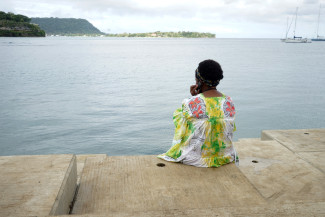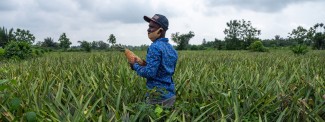|
|
|
The serious effects of the COVID-19 pandemic show how easily global value chains can be disrupted and how this can lead to cascading impacts on the businesses, workers and communities vital for sourcing and markets. Value chains are already naturally opaque and complex, so when it comes to shocks – such as the current pandemic or a climate-related event – companies lack understanding and visibility into their value chain vulnerabilities, which leads to an inadequate response.
This is compounded with another important factor: systemic socio-economic inequality further exacerbates the dangers to vulnerable populations posed by COVID-19 and the climate crisis. Communities with the least bear the brunt of these crises. Businesses have a role to play in helping to create a system that is better prepared to prevent and cope with the shocks to come while protecting those most affected.
Ultimately, what is clear with this pandemic is that there is a need to build resilience to shocks across value chains. But, the focus needs to be not only on the resilience of businesses but also that of communities, and people have to be at the core of crisis strategies.
Building resilience in value chains
Recognising that the complex, opaque and disaggregated nature of value chains is common across global corporate supply chains, the Value Chain Risk to Resilience (R2R) initiative by Business for Social Responsibility (BSR) works with its corporate members (Coca-Cola, Mars, Target, Santam, PepsiCo, McDonald’s, Anheuser-Busch and Primark) to collectively better understand and manage climate risk. In addition, the collaboration focuses on developing adequate resilience strategies within their value chains – strategies that ideally build climate resilience for communities, farmers and workers.
Resilience, for businesses and communities, is more important than ever as COVID-19 has shown how unprepared societies were for such a shock. Both the pandemic and climate crisis expose the underlying inequalities that exist in developed countries like the United States today. In developing countries, COVID-19 has affected workers in important economic sectors like the food and beverage and garment value chains.
Whether it is the impacts of a pandemic or an extreme climate event, those with the least will suffer the most. What these populations face have the potential to disrupt business, from operations and supply chains down to the vital communities on which business depends. There is a clear role for multinational business to build the resilience of these vulnerable communities while making their value chains more robust.
A new era of value chain risk management
From BSR’s work with the R2R initiative, it is very clear that global business has entered a new era of managing value chain risk. There are lessons learned that can help build resilience of both the business itself as well as its people across the value chain. Here are several priority actions for multinational business to take.
Conduct supply chain risk assessments. For a thorough climate risk assessment, a company could assess risk by commodity, raw materials, geography or at specific nodes of the value chain depending on the sector. Given that climate impacts and risks look different across the globe, including in developing countries, it is crucial to include perspectives in these assessments that account for the physical impacts as well as the socio-economic factors at play. This can include, for example, identifying gender barriers that women workers in factories or in farms might face in order to build resilient strategies that address them.
Manage supply chain risk from the top and on the ground. Climate risk must be integrated into enterprise risk management systems, and risk management should also be deployed (resilience programmes, risk assessments) in a way that can reach workers on the ground. Ensuring buy-in from leadership at C-Suite levels and decision-makers in regional/local offices is key to supporting the process and continuity from the top to the bottom.
Understand future scenarios.While risk assessments can identify current vulnerabilities or crisis hotspots, they do not thoroughly examine long-term uncertainty. To understand just how a business and its stakeholders will be affected, businesses should develop an understanding of a myriad of future scenarios, dependent on climate change as well as social, economic and political dimensions.
Enable suppliers to be more resilient. When identified in a supply chain risk assessment as vulnerable to shocks, there are many ways to help suppliers build resilience. To prevent shocks negatively impacting sourcing networks – including workers and communities – companies can adopt a “reverse sourcing” approach by developing resilience initiatives on the ground first as opposed to moving down through their supply chain from the top.
Understand how the people in business and vital communities are affected. Because some groups of people are disproportionately affected by shocks due to underlying inequalities and vulnerabilities, understanding these vulnerabilities across the value chain is key to building appropriate resilience strategies. The regional, national and local context is critical: knowledge of the socio-economic and political nuances with local partners must be acquired before initiatives are developed, for example, through stakeholder consultations and analysing results from climate risk assessments.
Learn how to measure resilience for business and other important communities. Measuring resilience is not as straightforward as quantifiable evaluations like emissions reductions, but nonetheless remains just as important. The R2R platform is identifying common metrics, for the planet, infrastructure and people aimed to measure the outcome and impact of climate resilience programmes and activities on both business and society.
Partner with governments and non-state actors.Partnerships are key when building resilience to shocks. Many of the essential resilience-building activities will only be possible when companies, governments and civil society come together. For example, a company can reinforce flood barriers around its own infrastructure, but a partnership with local government can further extend the resilience-building into the local community helping to ensure that workers can get to work and their communities are protected.
Business must recognise its role
Despite repeated warnings of a potential pandemic, governments, businesses and the general population were not ready for this public health crisis. They remains similarly unprepared to respond to the climate crisis. As reported by the IPCC, climate impacts are projected to worsen and become more unpredictable, even if governments and non-state actors succeed in meeting the Paris Agreement stretch goal of holding average global warming to 1.5oC. Compounding shocks further inhibit our ability to adequately respond to and manage the climate crisis, and vice versa.
Uncertainty looms not about if but when businesses and communities will experience future shocks, and whether they will be prepared to respond. Multinational business should recognise its role in building resilience, not just for its operations and shareholders, but for the communities and people integral to thriving value chains.
----------
Samantha Harris is Global Lead, Climate and People, BSR (Business for Social Responsibility)
Léa Farnier is Manager, BSR.
Header image of women on a street in Niamey, Niger - ©Ollivier Girard/EIF
If you would like to reuse any material published here, please let us know by sending an email to EIF Communications: eifcommunications@wto.org.



